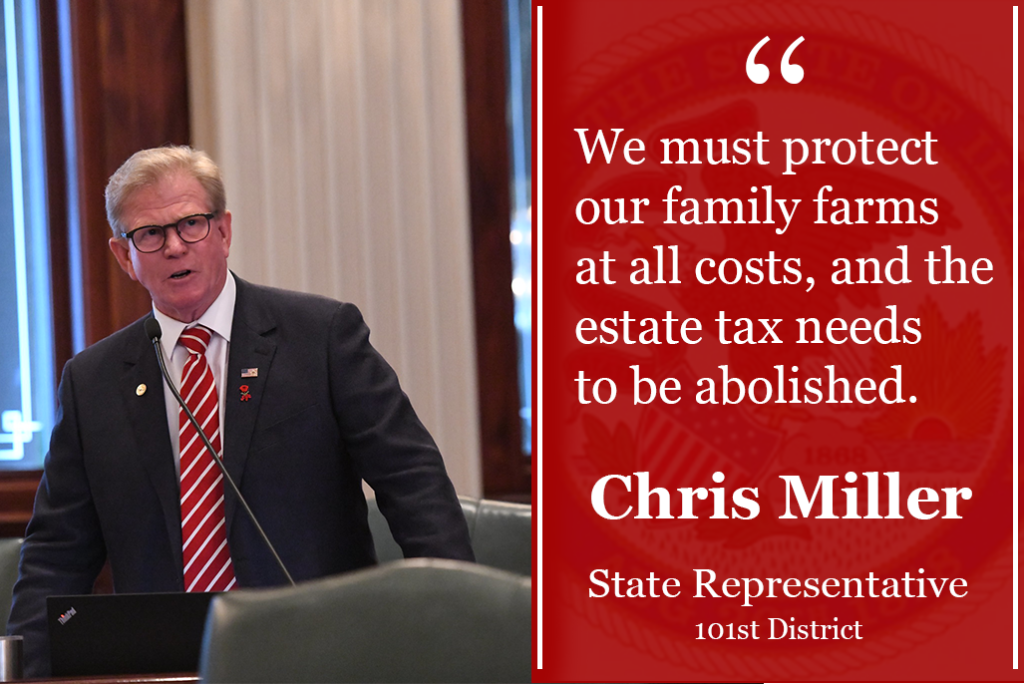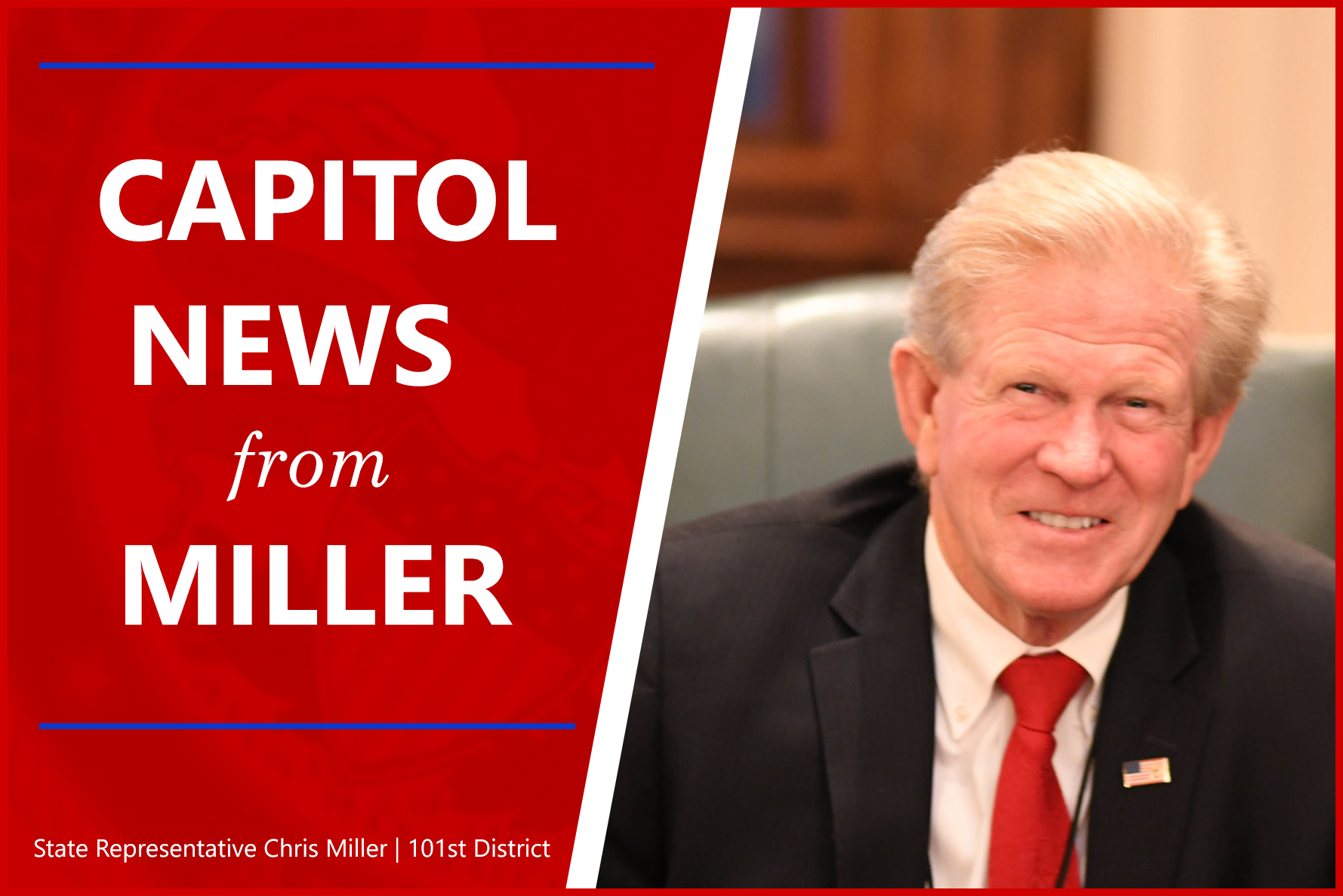BUDGET | IMMIGRATION | GUNS
BUDGET
House Republican leaders discuss budget priorities. House Minority Leader Tony McCombie and Republican Budgeteers discussed their priorities for the Fiscal Year 2025 State Budget at a press conference in Leader McCombie’s Capitol office Thursday.
As the General Assembly begins a new legislative session and looks ahead to the Governor’s budget address in two weeks, the Republican leaders wanted to set the stage for what they expect to be included in the upcoming FY25 budget proposal.
Leader McCombie outlined the House Republican priorities for the year:
- Holding the majority party accountable to spending
- No New Taxes – Illinois voters rejected a graduated income tax in 2020. We need to provide meaningful tax relief to Illinois residents.
- Tackling the State’s $141 billion pension debt
- Fixing state agency mismanagement and disfunction
- Meeting our prior fiscal obligations
- Real Ethics Reform – The federal corruption trials and convictions of the ComEd Four, former Madigan Chief of Staff Tim Mapes, former Chicago Alderman Ed Burke, and the upcoming trial of former House Speaker Michael J. Madigan should instill action in the majority party to work with Republicans on meaningful ethics reform proposals.
- Properly funding education via the evidence-based model
- Prioritizing state services for Illinois citizens
“House Republicans want to be part of the solution,” Leader McCombie said. “We have reached out to the Governor, Senate President Harmon, and Speaker Welch to again ask them to work with us. But to that tune, it takes two to negotiate. And most importantly, we must negotiate in good faith. That requires trust to be rebuilt, where it has been broken by Speaker Welch in last year’s budget process.”
Norine Hammond, Deputy Republican Leader and chief budgeteer for the House Republicans, pointed out that just last week, Republicans joined with Democratic colleagues in bipartisan support of a plan to protect family farms by changing Illinois’ burdensome estate tax. This effort underscores that we can work together across the aisle to advance meaningful improvements to our tax and budgetary policies.
Representative Chris Miller agrees that bipartisan efforts should be made to address the awful estate tax, but he would like to see it completely abolished.
“There should be no option that allows private equity corporations to purchase a family farm due to the taxes required to be paid after a death,” said Rep. Miller. “Illinois continues to place burdens on families who own farms and our Governor is happy being in the top 12 states with a death tax.”

Governor to deliver Budget/State of the State Address next week. The Illinois State Budget for Fiscal Year 2025 (that will begin on July 1, 2024) will be a major challenge for the State. With spending already bumping up against the limits of current state revenue, the budget for the current FY24 fiscal year (ending June 30, 2024) is barely balanced at best. More accurate figures point to Illinois running a “hidden” current deficit of as much as $890 million, a gap met by slow-paying bills and by dipping into one-time cash sources. Furthermore, the nonpartisan Commission on Budget Forecasting and Accountability (CGFA) is now seeing current declines in key State tax revenue streams such as the income tax. These facts are in front of Gov. Pritzker and his aides as they prepare the Governor’s budget address to be delivered to a joint session of the Illinois General Assembly on Wednesday, February 21. With Springfield spending already up to and matching current and potential future State revenues, Illinois cannot afford to add new spending programs for FY25.
House Republicans have taken the lead as they urge spending restraint. Illinois continues to have one of the lowest credit ratings of any of the 50 states, and charges along the highest per-capita tax loads. Illinoisans must pay property, income, and sales taxes to their State and local governments, and comparable government services cost more in Illinois than they do in most other U.S. states. At the same time, however, advocates and lobbyists continue to demand more money to be spent on existing programs, or to create new ones. These could quickly become voices for even higher Illinois tax rates, or for the creation of entirely new taxes. House Republican Leader Tony McCombie told the press last week that there should be no new Illinois taxes and no new spending programs. In a press conference with House Republican “budgeteers” Norine Hammond and Amy Elik, McCombie doubled down on the need to put Illinois’ working families first, rather than new spending programs and higher taxes.
CGFA: Income tax receipts down in January. The numbers, which reflect State tax revenue intake, were published in the “Monthly Briefing” published by the General Assembly’s Commission on Government Forecasting and Accountability (CGFA) as tracking of State revenues in January 2024. Although the U.S. economy continues to be strong nationwide, payment of income tax to the Illinois Department of Revenue (IDOR) dropped significantly in January 2024. Relative to the prior year, personal income taxes paid to IDOR were down $52 million from the previous year, and corporate income tax payments were down $15 million, creating a total income tax shortfall of $67 million.
Although State sales tax receipts rose $16 million during the same period, the income tax shortfall was decisive in producing overall negative revenue trend numbers for January. Across all general funds tax lines, State of Illinois January 2024 revenues were down $22 million from the year-earlier month. This cash flow number marks what could be a significant negative turnaround from the generally positive numbers chalked up by IDOR during the first half of FY24. During this period, Illinois income tax revenues and overall tax revenues posted a series of numbers that were able to keep up (just barely) with the swelling spend rates of the State as authorized by the Democrats’ FY24 State of Illinois Budget.
ILLEGAL IMMIGRATION
Pritzker Administration admits controversial immigrant healthcare program is running more than $200 million over budget. Swirling disputes have confused all parties involved, including health care providers, with respect to two conjoined programs that provide taxpayer-funded health care for undocumented immigrant adults in Illinois. The programs are called “Health Benefits for Immigrant Adults” (HBIA) and “Health Benefits for Immigrant Seniors” (HBIS). Federal law provides that healthcare benefits for people in these categories are not eligible for federal Medicaid matching funds.
These HBIA and HBIS programs have become one of the largest components of the State’s overall budget. $550 million was appropriate for these programs in fiscal year 2024. As enrollments and costs mounted well above this number, the Pritzker administration implemented enrollment freezes within both programs. As of February 2024, no new migrant patients can be enrolled in these programs, nor can they enroll themselves. Costs have continued to increase, however, as persons who enrolled before the freeze deadline are fully eligible to receive healthcare benefits. Many of these individuals are patients with chronic and complex medical conditions. The Pritzker administration has begun to enforce limited patient co-payment requirements under terms required by the Illinois Department of Healthcare and Family Services (HFS).
Anticipated costs have, however, continued to increase. The copayment requirements are not, by themselves, enough to get a budgetary handle on the program. In testimony to the General Assembly’s Joint Committee on Administrative Rules (JCAR) on Tuesday, February 6, an HFS spokesperson confessed that current spending trends lead to anticipated expenditures for these programs at $773 million in FY24. This represents a $223 million cost overrun from the sum appropriated by the General Assembly at the start of the fiscal year.
GUNS
Gun rights advocates appeal to U.S. Supreme Court to strike down Illinois gun ban. The Protect Illinois Communities Act (PICA), enacted in January 2023 by a lame-duck General Assembly, bans numerous semi-automatic firearms and the possession of items related to these firearms. Persons who oppose the unencumbered right to keep and bear firearms call the PICA-banned firearms “assault weapons,” and the items banned by PICA include items such as gun fixtures, gun fittings, and larger-capacity ammo clips.
Many Illinois gun owners, relying on the overall protection granted to them by the federal Second Amendment, have maintained their confidence that the new law would be struck down. The Illinois State Police has created a webpage so that gun owners can register their priorly-possessed firearms and items that will be banned going forward, but many Illinois gun owners appear to have boycotted the registration process. At the same time, several gun rights advocacy groups have begun to take legal action against the controversial new law.
Petitions filed this week with the United States Supreme Court formally ask that previous court decisions that have upheld the gun ban law be reversed and that the law be struck down. The plaintiffs have begun to cite prior decisions from the nation’s highest court, handed down in other cases, that have generated precedents in favor of gun rights. As this case moves forward, interested parties can “amicus curiae” briefs on the PICA case that will set forth more precedents and arguments. The U.S. Supreme Court has the power to strike down the Illinois law as unconstitutional.
